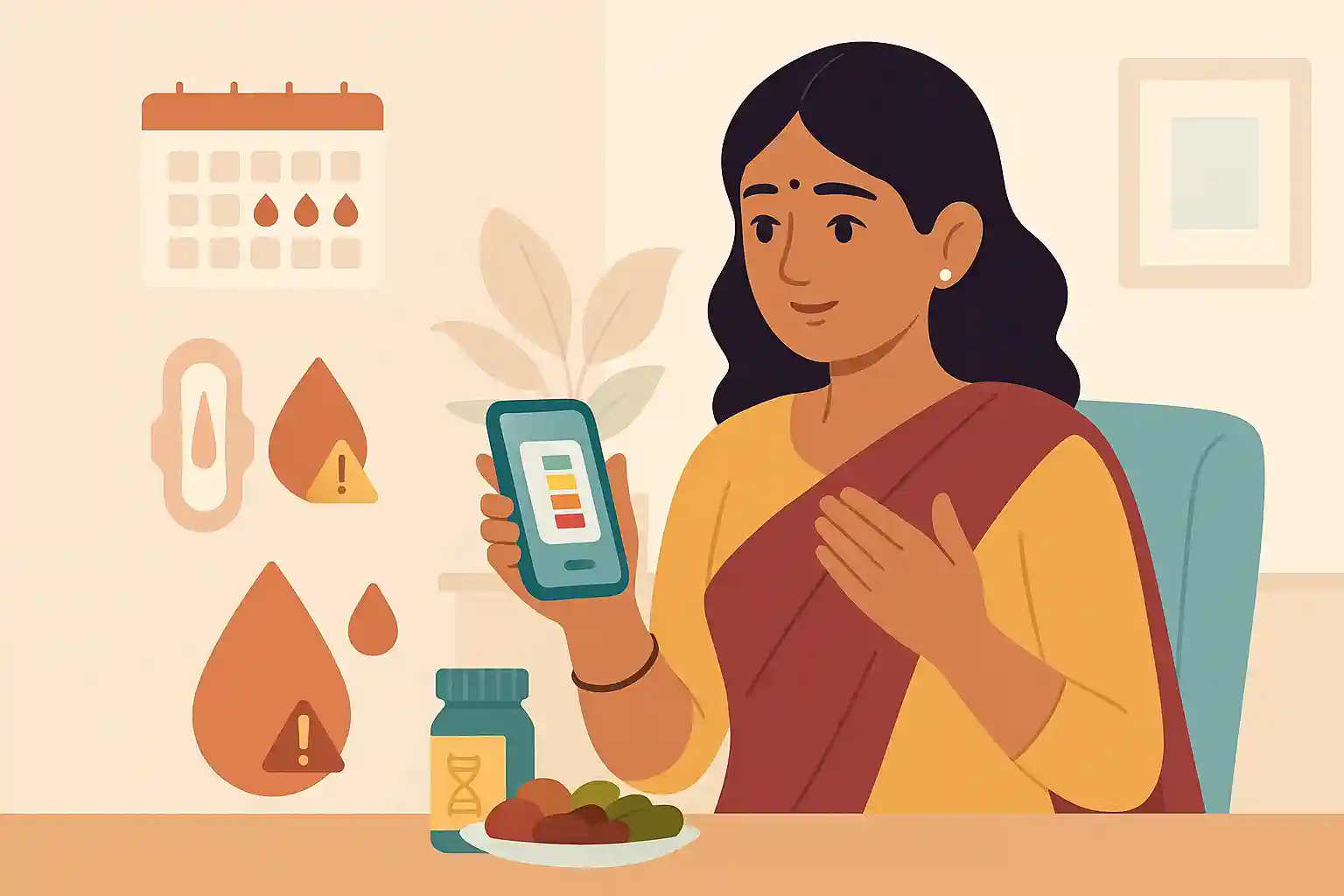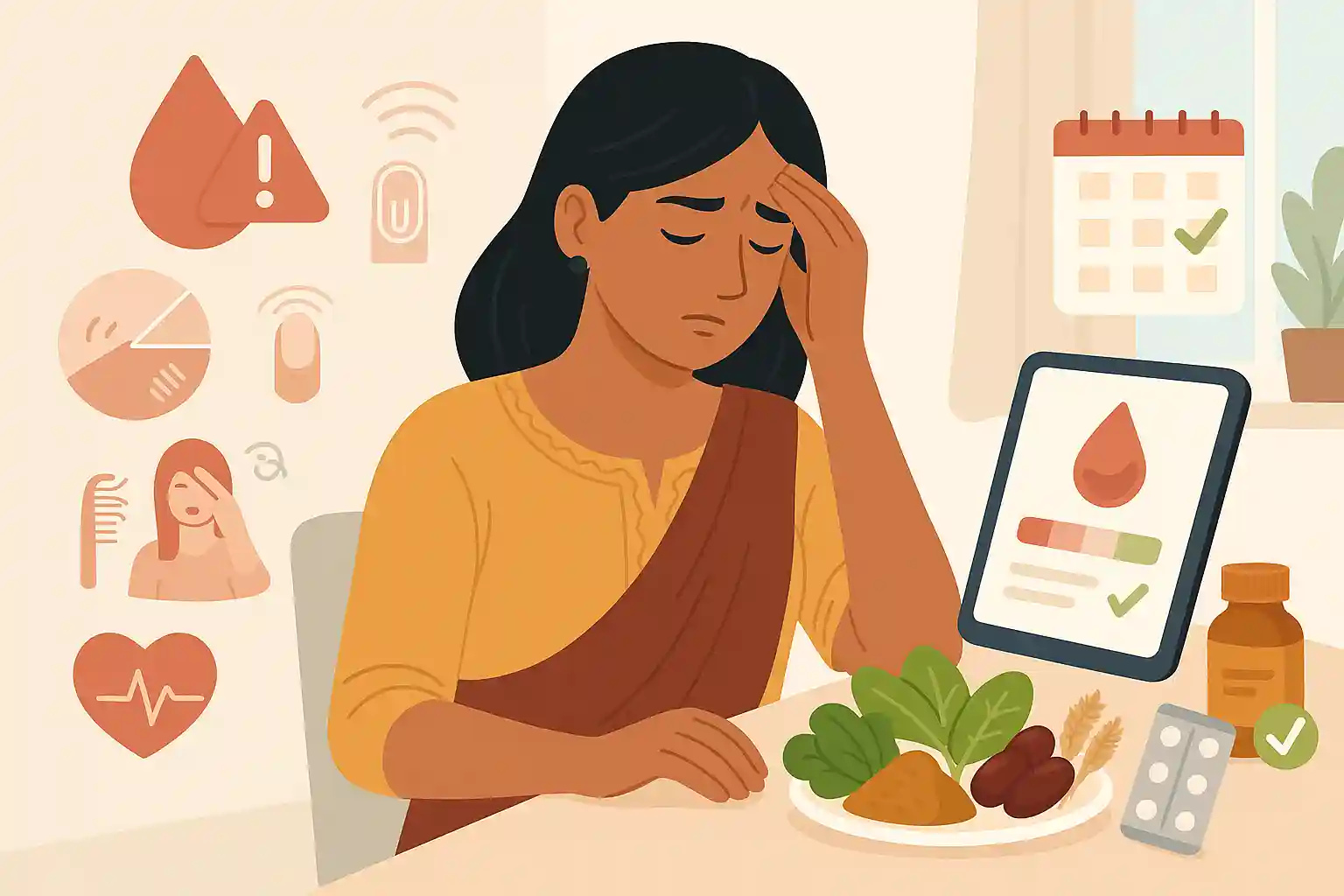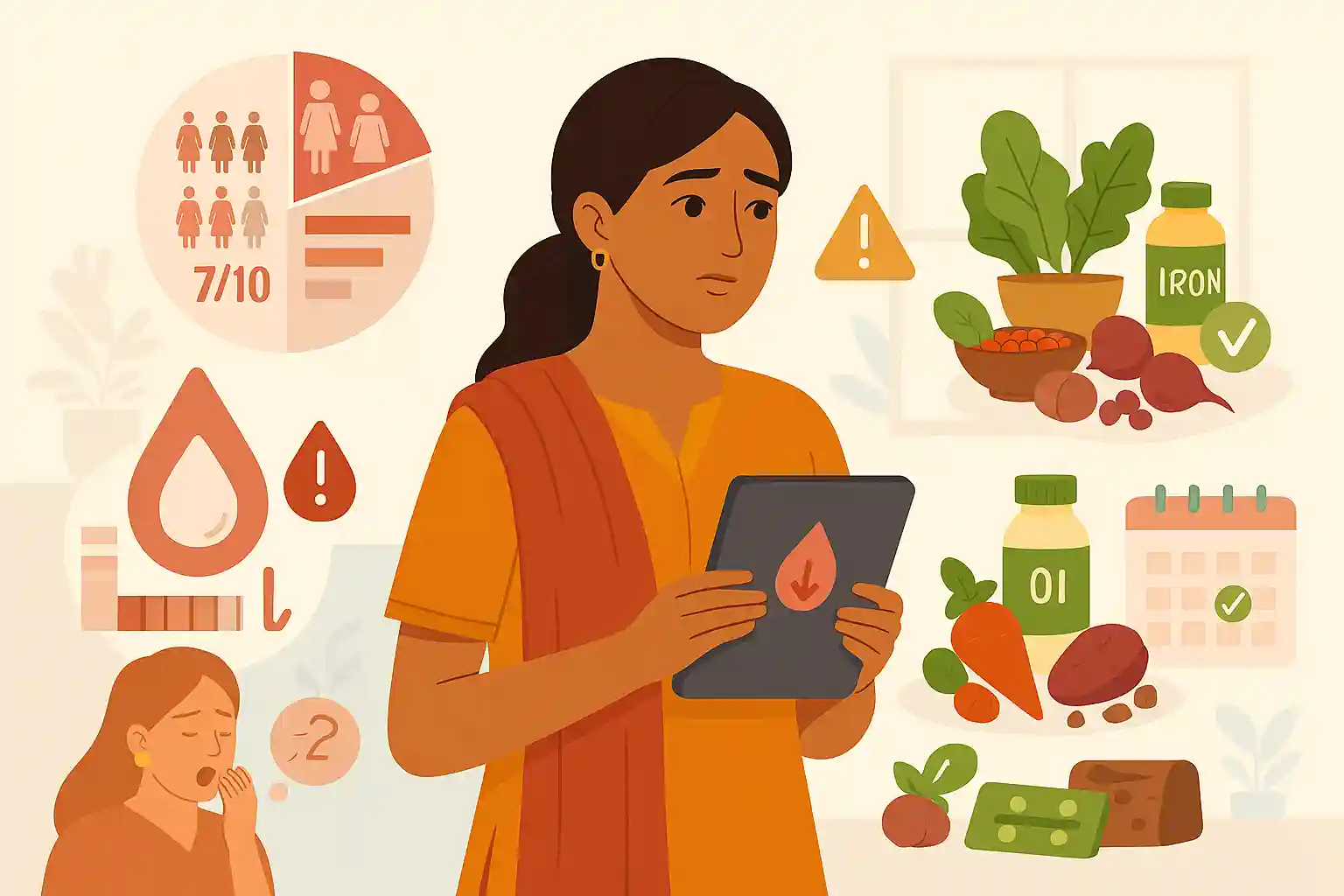"My periods have always been heavy, so I thought this was normal." This statement reflects the reality of millions of Indian women who suffer from anemia caused by menstrual blood loss, yet never make the connection. While periods are natural, losing excessive blood month after month isn't—and it's silently destroying your health, energy, and quality of life.
Understanding the menstrual-anemia connection and monitoring your hemoglobin strategically can break this cycle and transform how you feel every single month.
Why Periods Cause Anemia in Indian Women
The Iron Loss Reality:
- Normal periods: Lose 15-30mg iron monthly
- Heavy periods: Lose 50-80mg iron monthly
- Daily iron absorption from food: Only 1-2mg
- Indian vegetarian diets: Even lower iron absorption
- It takes months to replenish what's lost in one heavy cycle
Why Indian Women Are More Vulnerable:
- Poor baseline iron stores due to dietary factors
- Multiple pregnancies depleting iron reserves
- Cultural silence around discussing menstrual problems
- Delayed medical care for 'women's problems'
- High prevalence of fibroids and PCOS causing heavy bleeding
Recognizing Heavy Menstrual Bleeding
Medical Definition of Heavy Periods:
- Bleeding for more than 7 days
- Changing pad/tampon every hour for several hours
- Using two pads at once or overnight protection during day
- Blood clots larger than a coin
- Flooding or leakage despite proper protection
Simple Home Assessment:
- Count total pads/tampons used per cycle
- Heavy: More than 16 pads or 20 tampons per cycle
- Very heavy: More than 25 pads per cycle
- Track clot size using coin comparison
- Note any flooding episodes
Smart Hemoglobin Monitoring Strategy
Timing Your Tests:
- Best time: 7-10 days after period ends (hemoglobin at lowest)
- Avoid testing during periods (unreliable results)
- Don't test immediately after periods (body still compensating)
- Heavy bleeders: Test every 3 months
- Normal periods: Test every 6 months
What to Test Beyond Basic Hemoglobin:
- Complete Blood Count (CBC): Shows iron deficiency patterns
- Serum ferritin: Measures iron stores (most important)
- Iron studies: TIBC and transferrin saturation
- Vitamin B12 and folate: Rule out other deficiencies
Understanding Your Results
Hemoglobin Levels for Women:
- Normal: 12.0-15.5 g/dL
- Mild anemia: 10.0-11.9 g/dL
- Moderate anemia: 7.0-9.9 g/dL
- Severe anemia: Below 7.0 g/dL (urgent care needed)
Ferritin Levels (Iron Stores):
- Optimal: 50-150 ng/mL
- Low stores: 15-30 ng/mL (will become anemic soon)
- Depleted: Below 15 ng/mL (anemia likely)
- Target for heavy bleeders: Keep above 50 ng/mL
The Menstrual Cycle Impact on Hemoglobin
Normal Monthly Pattern:
- Days 1-5: Hemoglobin drops due to blood loss
- Days 6-15: Body begins replacing lost iron
- Days 16-28: Hemoglobin gradually recovers
- Heavy bleeders: May never fully recover before next cycle
Warning Signs Your Periods Are Causing Anemia:
- Extreme fatigue that worsens each month
- Feeling weak and dizzy during or after periods
- Hemoglobin consistently dropping month to month
- Ferritin levels below 30 ng/mL despite supplementation
- Symptoms improving slightly between periods but returning
Breaking the Cycle: Treatment Strategies
Immediate Iron Replacement:
- Higher doses needed: 100-200mg elemental iron daily
- Take between periods for better absorption
- Continue for 3-6 months after hemoglobin normalizes
- IV iron for severe cases or poor oral tolerance
- Monitor progress with monthly testing initially
Reducing Menstrual Blood Loss:
- Hormonal treatments: Birth control pills, IUDs
- Non-hormonal options: Tranexamic acid during periods
- Treat underlying causes: Fibroids, PCOS, thyroid disorders
- Lifestyle factors: Maintain healthy weight, manage stress
Nutritional Support During Heavy Periods
Optimize Iron Absorption:
- Take iron with vitamin C: Amla, citrus fruits, tomatoes
- Avoid tea/coffee for 2 hours after iron supplements
- Cook in iron pots when possible
- Include heme iron: Fish, chicken, organ meats
- Combine iron-rich vegetables with lemon juice
Period-Specific Nutrition:
- Increase iron intake week before periods
- Extra protein during heavy flow days
- Stay hydrated to support blood volume
- B-complex vitamins for energy support
- Anti-inflammatory foods: Turmeric, ginger, leafy greens
Creating Your Monitoring Schedule
Heavy Period Monitoring Plan:
- Month 1: Baseline CBC, ferritin, iron studies
- Month 2: Hemoglobin check post-period
- Month 3: Full panel to assess improvement
- Continue monthly until hemoglobin stable above 12 g/dL
- Then switch to quarterly monitoring
Normal Period Monitoring:
- Every 6 months: Basic hemoglobin check
- Annually: Complete iron panel with ferritin
- Increase frequency if symptoms develop
- Before major life changes: Pregnancy planning, surgery
When to Seek Medical Help
Urgent Medical Attention Needed:
- Hemoglobin below 8 g/dL
- Bleeding for more than 10 days
- Severe weakness, dizziness, or fainting
- Chest pain or shortness of breath
- Bleeding between periods or after sex
Schedule Gynecology Consultation For:
- Consistently heavy periods (>7 days or >16 pads)
- Periods getting heavier over time
- Large clots (bigger than coins)
- Periods interfering with daily activities
- Anemia despite iron supplementation
Cost-Effective Testing in India
Testing Costs:
- Basic hemoglobin: ₹100-300
- Complete Blood Count: ₹200-500
- Serum ferritin: ₹600-1000
- Complete iron panel: ₹1200-2000
- Government hospitals: 50-70% cheaper
Smart Testing Strategy:
- Start with basic hemoglobin to confirm anemia
- Add ferritin if hemoglobin low
- Complete panel only if moderate-severe anemia
- Use government facilities for routine monitoring
- Private labs for urgent or comprehensive testing
Breaking Cultural Barriers
Discussing Menstrual Health:
- Frame as general health concern, not just 'women's problem'
- Use medical terms: 'excessive menstrual bleeding' vs 'heavy periods'
- Emphasize impact on productivity and daily life
- Share information with female family members
- Seek support from other women who've addressed similar issues
Your Action Plan
This Month:
- Track your menstrual flow for one complete cycle
- Get baseline hemoglobin test 7-10 days after period ends
- Calculate total pads/tampons used
- Note any symptoms during or after periods
If Heavy Bleeding Confirmed:
- Schedule gynecology consultation
- Get complete iron panel done
- Start iron supplementation as recommended
- Plan treatment for underlying causes
Long-term Monitoring:
- Regular hemoglobin tracking based on your risk level
- Annual iron store assessment
- Adjust supplementation based on results
- Continue monitoring even after periods regulate
The Bottom Line
Your periods don't have to steal your energy and health every month. By understanding the menstrual-anemia connection and monitoring your hemoglobin strategically, you can break the cycle that keeps millions of Indian women in a state of chronic fatigue and poor health.
Heavy periods aren't just an inconvenience—they're a medical condition that deserves proper attention and treatment. Smart hemoglobin monitoring helps you catch problems early and track improvement effectively.
Don't accept fatigue as your normal. Start tracking, testing, and treating the root cause. Your energy, productivity, and quality of life depend on taking your menstrual health seriously. The connection between your periods and your overall health is real—and so are the solutions.



